
Drova: Forsaken Kin Review
Ever since its release late last year, I had heard a lot of good word of mouth about Drova: Forsaken Kin. We covered the game on RPG Site, but in the always-crowded fall season, it fell through the cracks in terms of a final review. During a relatively quiet period of releases over the summer, I finally made time to see what this punishing pixel-art RPG was all about.
At the time I was starting up the game, I had already seen several comparisons to games like The Elder Scrolls III: Morrowind and Gothic, which are unfortunately two games I haven't played -- I suppose my closest point of comparison might be the Elex titles. Regardless, with this comparison in mind and considering some other reviews, I was expecting a title that was mostly open-ended to start, with a general gritty fantasy setting, and I expected to feel like a complete weakling at the beginning of the game. That turned out to be absolutely true.
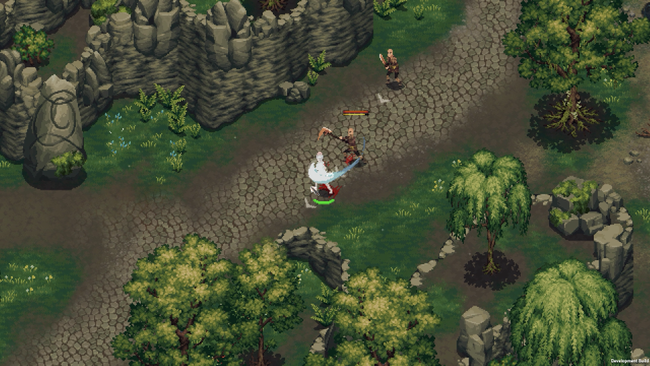
At the outset of the game, I found myself following a pair of druids in a misty forest, looking for an entrance to the eponymous Drova, the so-called Land of Legends. However, as the story unfolded, I found myself transported and stranded in a dreary, worn-down world that seemed more like a land of ruin rather than one of legends. Equipped and armed with basically nothing but a mysterious crystal, I set off to figure out exactly where I was and how to find a way back home.
Right from the outset, Drova (the game) is very clear about what kinda of game it is. I found a tree branch to use as my first weapon, and I eventually came across a small woodcutter's camp filled with a smattering of NPCs. Through some initial early quests and some dialogue cues, I learned that Drova (the place) is currently divided between two key camps: the Remnants and the town of Nemeton. While Drova does effectively tell a linear story, it's presented in a relatively muted fashion to start.
Both the Remnants and Nemeton are made up of not very good people. The Remnants are basically slavers that force most of their population to toil away in the silver mines for unfair pay and basically represent barely-structured anarchy. Nemeton places itself as opposition to the Remnants and presents itself as a sort of city-on-a-hill. However, underneath that shiny exterior is a highly stratified social structure that punishes any dissent with witch-like burnings in the town square. Regardless, these are the sorts of societies that make up the land of Drova that player must decide between to eventually make their way home.
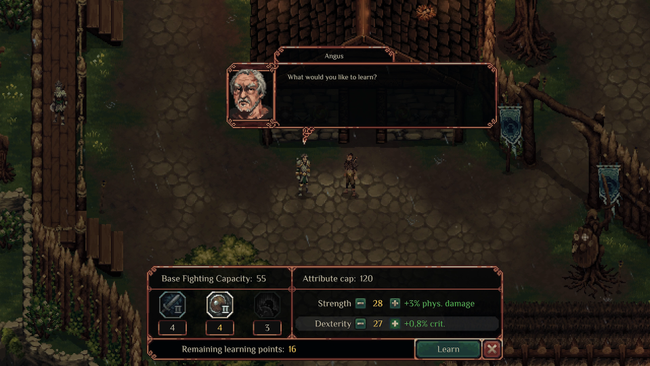
The early quests in Drova are more about finding footing in the world and learning about its inhabitants than anything with significant stakes. The early hours had me trying to help the camp members fix a nearby broken bridge or figure out who was stealing from the stash of apples in the orchard. In return, I was promised access to better items and gear. From a narrative perspective, this sort of progression makes sense as the player is basically trying to establish themselves with no real reputation to speak of. From a gameplay perspective, this is the manner in which the player is able to push back against the punishing world they find themself in.
One thing that constantly surprised me about my time in Drova is that, despite the fixed top-down perspective and simplistic artstyle, environmental exploration is dense and challenging. Since this is what the bulk of the moment-to-moment gameplay consists of, I found this to be one of the game's biggest strengths. If I followed the roads and beaten path, I would generally be safe and within a short trip of small pockets of civilization where I could gear up and rest. However, I would find it easy to get lost for hours at a time if I decided to explore further.
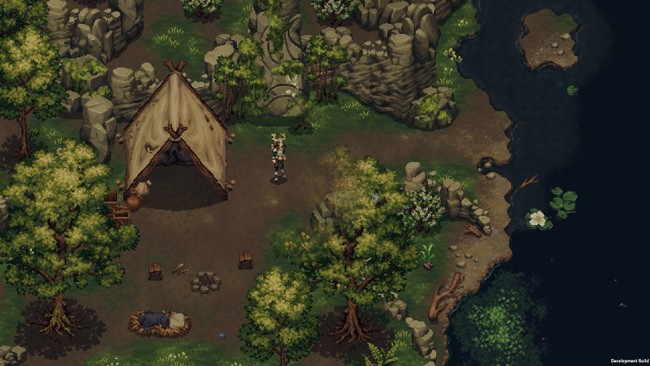
Drova is definitely a game with a lot of friction. I saw the game over screen several times when I would attempt to be bolder than my current strength was really suitable for. Drova is also the sort of game that very clearly communicates to the player that they might be better off returning to specific locations once they've gotten stronger (or at least, better prepared). As always with these sorts of games, it feels incredibly rewarding over a long period of time to slowly progress from being able to fend off a small group of wolves, to eventually bears and armored revenants.
The inhabitants of Drova are also a key source of this friction. For example, another early-game quest involving the Remnant faction involved heading to the aforementioned silver mine. On the way, a pair of highwaymen ambushed me and required payment in order to proceed. Despite reloading my save a few times, I was simply not strong enough to outright refuse their demands and fight them off. After several failed attempts, I had to swallow my pride and straight up pay the toll in order to use the road.
Although this is a fairly straightforward example, I believe it represents the overall style of the game well. This game does not try to flatter the player simply for being the main character. Instead, it almost insists on a level of humility, teaching players when to push forward and when to recognize that they are at a disadvantage.
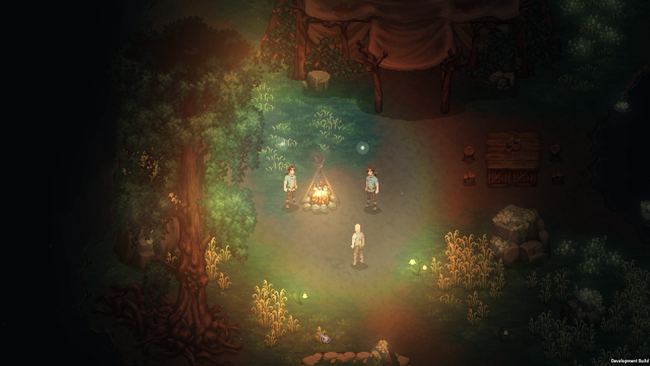
I haven't touched on player progression yet, but it does also tie into the world design in small ways. Earning experience will grant the player learning points, but these have to be spent at specific NPCs throughout the world. Learning points and a few stat-up potions can also be acquired in a few other ways, but the majority come from conventional level-ups. These "trainer" NPCs will often only offer their service upon completing specific quest lines.
These trainers will offer the player the ability to either spend their learning points to improve their Strength or Dexterity stats, or to earn specific skills such as Basic Swordfighting or Lockpicking. Each weapon type of Sword and Shield, Spears, Axes, or Daggers plays pretty differently, and learning points are scarce enough that it is impossible to be a master of everything. This requires players to specialize in a specific weapon type early. However, the game eventually allows players to reset their learning points, ensuring they are not locked into an early choice indefinitely.
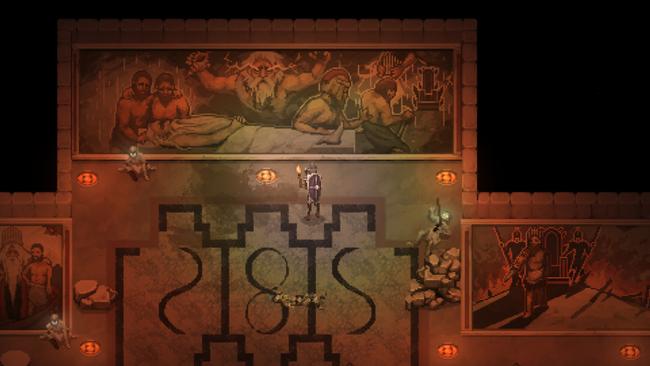
As for quests and characters themselves, they are usually simply designed on their face, but the exploration of the world and lack of overt waypointing make even simple tasks feel somewhat challenging. As specific as it sounds, I actually found that having decent memory of NPC names and places (or potentially diligent note-taking) to actually be really helpful. With dozens of named NPCs across different areas of the world, I would learn how each one relates to the world at large, such as a former inhabitant of the woodcutter camp deciding to join the Remnants, or finally meeting a specific character at the town of Nemeton after he was name-dropped a couple of times in earlier quests.
Despite most everything on the gameplay front meshing together in smart and challenging ways, most of my personal shortcomings with Drova: Forsaken Kin revolve around the overall storytelling and narrative. Despite eventually having to pick between the Remnant and Nemeton factions, the story progression is largely identical regardless of the choice made. In fact, there is not a lot of choice or consequence present at all. While not every RPG needs to have an intricate branching narrative based on player choice, it felt like an odd design choice in a game like this to funnel the player to only a single type of ending with scant few variations.
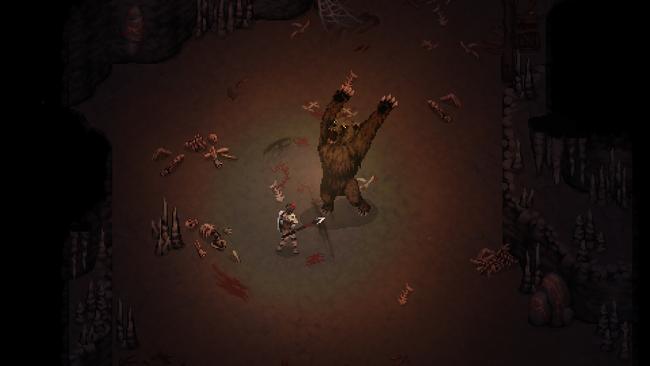
One key moment that cemented this for me was at a point in Act 3 (of 5 total acts) where I found myself railroaded to a specific outcome with no real say in the matter. Despite some indication that I might be able to affect the outcome of the quest, I learned after the fact that everything was pre-determined regardless of my choices or even which faction I ultimately chose.
Past this key story moment, I found myself basically tethered to the final linear progression of the game towards an ending that left far more questions unanswered than I expected. I'm usually a huge fan of more open-to-interpretation type endings that don't leave everything wrapped up in nice little bows. Drova's ending, however, felt more like a car that ran out of gas rather than actually arriving at its intended destination.
Despite an underwhelming conclusion, Drova: Forsaken Kin is an incredibly fun and challenging game in many ways, and it likely would have made my personal top five last year had I played it when it released. It utilizes a smart integration of challenging environmental exploration, rewarding player progression, and intricate world design to create one of the most engaging RPGs I've played in a while. Only some shortcomings with writing and storytelling hold it back from being recommended without hesitation.